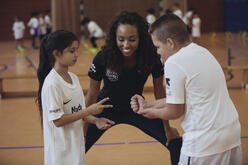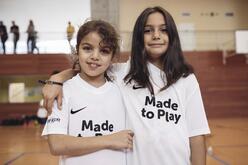New York, NY, October 4, 2018 — 3, 2, 1... and go! Children scream gleefully as they race across the gym of the Löwenzahn Primary School in Berlin-Neukölln, Germany. Around 40 students ages six to ten are letting off some energy after a long day in the classroom. Running and playing – the normal madness in the weekly training sessions of "Berlin Kickt" a Made to Play program by Nike as well as buntkicktgut and the International Rescue Committee.
But today the kids are especially excited as two very special guests will be joining them. As part of the European Week of Sport, Nike invited two German athletes to the weekly training session of Berlin Kickt: Jacqueline Otchere (22), the German pole vault athlete and Maximilian Mittelstädt (21), football player at Hertha BSC. There’s no shyness visible. When Julia of buntkicktgut, an NGO for intercultural street football, calls all the children together in a circle and introduces the two athletes, the crowd loudly calls back "Hello Jacqueline, Hello Maxi!”.

During the Q&A, the kids do not hold back with their questions: When do you get up in the morning? Do you go to the gym? How many hours a day do you play sports? Have you always wanted to become a footballer? When one of the girls asks how difficult it is to make a backward jump, Jacqueline is on board right away to give a live demonstration. Today it's all about these experiences: professional athletes show children how much fun exercising can be and that there is an athlete in each of them.
Is it an everyday scene at a school gym? Not necessarily. The Löwenzahn Primary School, located in the heart of Berlin-Neukölln, a district known nationwide for its high proportion of people with a migration background and foreign citizenship (44.3%, of whom almost half come from Muslim states), sees itself as a multicultural, integrative school that creates a dialogue between different cultures. Particularly in recent years, the number of children who came to Germany with their families, fleeing war and conflict, has increased; it is estimated that there are currently more than 15,000 refugee kids in Berlin. This makes it all the more important to create a safe and stable environment for children where they can play and learn, and where caring and reliable adults support them. And this is exactly what Berlin Kickt is aiming for – together with the Löwenzahn Primary School.
Dan Burrows, Senior Director for Global Community Impact at Nike EMEA explains: “It is great to be here at the Löwenzahn Grundschule School to celebrate the power of sport through our Berlin Kickt program. Research shows that physically active children do better in and out of school but today’s kids are the least active generation in history. We believe all kids are Made to Play and we are proud to work with IRC Deutschland and buntkicktgut to inspire kids to play more often and integrate through the universal language of football.”
The universality of sport is exemplified in each of the School Football Workers. The six coaches, aged between 19 and 22 and almost all with a migration background, are real role models. "Building new relationships is important for the children," confirms Principal Utta Kioschis, "especially because many of the children wish are longing for more attention. Berlin Kickt hits the nerve of our pupils because young people who themselves have a migration background take care of them."
Having coaches as role models, to whom there are parallels, helps enormously: for example, there is School Football Worker Mohammed, who came to Germany from Syria three years ago and has been an active coach at buntkicktgut for two years. Or the coaches Chaima and Rascha, Berlin women with Algerian and Lebanese roots, who are important role models for the girls at Berlin Kickt.

Julian Buning, Managing Director of buntkicktgut, the NGO that selects and supervises the School Football Workers, has a similar view: "It's nice to see how our young coaches take on responsibility and are a role model for younger people. We are convinced that through this work we can make an important contribution to the neighbourhood".
The overall structure of Berlin Kickt makes the program special. It is not only about sport and exercise, but also about psychosocial support. In between the training, coaches and children pause and do a few mindfulness exercises like controlled breathing. Through these activities, the children strengthen their own perception, consciously perceive the moment and themselves, which has a positive effect on the child's well-being and self-confidence. These exercises, which IRC makes available in Healing Classrooms workshops to both coaches and teachers at the school, help the children to develop their own resilience and to feel comfortable. This also helps the pupils who have fled war or conflict, to reduce the negative stress they are subjected to. In sports they experience and learn, what community, tolerance and fairness mean.
Stefan Lehmeier, Programme Director at IRC Germany, sums it up as follows: "Berlin Kickt brings together not only partners such as buntkicktgut, Nike and the International Rescue Committee, but above all children, coaches and teachers. In class and in the sports hall we promote the children's self-esteem, through mindfulness exercises we strengthen their own perception, and through regular training the children build up new relationships – with each other and with the trainers".
About Berlin Kickt:
The project "Berlin Kickt" combines the universal language of football with social and emotional skills. Supported by Nike, buntkicktgut, an NGO for intercultural street football, is implementing the project with IRC Deutschland. Using the Healing Classrooms approach, qualified School Football Workers are trained, who hold the weekly sessions with the (refugee) children on site. In workshop units, School Football Workers and teachers learn to use classrooms and gyms as safe and integrative places to learn. Since the school year 2016/2017, Berlin Kickt has been active at five primary schools in Berlin and wants to address girls in particular. In April 2018, the program celebrated a huge event at the hangars at the old airport in Tempelhof. Read more about it here.
About the Healing Classrooms approach:
Crises and conflicts have profound effects on the development of children and young people. At the same time, however, these young people are remarkably resilient. With the right support, the negative effects of suffering and stress can be reduced. The Healing Classrooms approach shows pedagogical professionals ways in which they can promote this process in school.
The concept of Healing Classrooms is based on IRC's 30 years of experience in education in crisis regions and has been tested in practice for over a decade. Unlike many educational programs, Healing Classrooms also promotes social-emotional learning and mindfulness. Research shows that social-emotional learning programs improve students' everyday skills and academic performance.